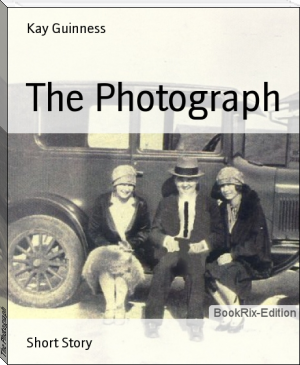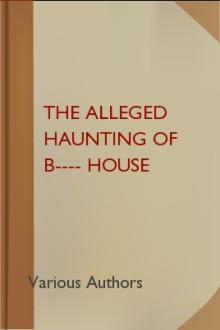Indian Ghost Stories - S. Mukerji (finding audrey .txt) 📗

- Author: S. Mukerji
- Performer: -
Book online «Indian Ghost Stories - S. Mukerji (finding audrey .txt) 📗». Author S. Mukerji
There were no electric lights then in Calcutta or in any part of India, no motor cars and no rubber-tyred carriages.
On a reception night lots of people come to watch the decorations of Government House. Now-a-days Government House is illuminated with electricity; but I am told by my elders that in those days when tallow candles and tiny glass lamps were the only means of illumination the thing looked more beautiful and gorgeous.
The people who come to see the illumination pass along the road and are not allowed to stop. The law is that they must walk on and if a young child stops for more than half a minute his guardian, friend, nurse or companion is at once reminded by the policeman on duty that he or she must walk on; and these policemen of Calcutta, unlike the policemen of London, are not at all courteous in their manner or speech.
So it happened on a certain reception night that Hasan Khan the black artist went to see the decorations and while lingering on the road was rudely told by the policeman on duty to get away.
Ordinarily Hasan Khan was a man of placid disposition and polite manners. He told the policeman that he should not have been rude to a rate-payer who had only come to enjoy the glorious sight and meant no harm. He also dropped a hint that if the head of the police department knew that a subordinate of his was insulting Hasan Khan it would go hard with that subordinate.
This infuriated the policeman who blew his whistle which had the effect of bringing half a dozen other constables on the spot. They then gave poor Hasan Khan a thrashing and reported him to the Inspector on duty. As chance would have it this Inspector had not heard of Hasan Khan before. So he ordered that he should be detained in custody and charged next morning with having assaulted a public officer in the discharge of his duty.
The Inspector also received a warning but he did not listen to it. Then Hasan Khan took out a piece of paper and a pencil from his pocket and wrote down the number of each of the six or seven policemen who had taken part in beating him; and he assured everybody (a large number of persons had gathered now) present that the constables and the Inspector would be dismissed from Government service within the next one hour.
Most of the people had not seen him before and not knowing who he was, laughed. The Inspector and the constables laughed too. After the mirth had subsided Hasan Khan was ordered to be handcuffed and removed. When the handcuffs had been clapped on he smiled serenely and said "I order that all the lights within half a mile of where we are standing be put out at once." Within a couple of seconds the whole place was in darkness.
The entire Government House Compound which was a mass of fire only a minute before was in total darkness and the street lamps had gone out too. The only light that remained was on the street lamp-post under which our friends were.
The commotion at the reception could be more easily imagined than described.
There was total darkness everywhere. The guests were treading literally on each other's toes and the accidents that happened to the carriages and horses were innumerable.
As good luck would have it another Police Inspector who was also on duty and was on horse-back came up to the only light within a circle of half a mile radius.
To him Hasan Khan said "Go and tell your Commissioner of Police that his subordinates have ill-treated Hasan Khan and tell him that I order him to come here at once."
Some laughed others scoffed but the Inspector on horse-back went and within ten minutes the Commissioner of the Calcutta Police came along with half a dozen other high officials enquiring what the trouble was about.
To them Hasan Khan told the story of the thrashing he had received and pointed out the assailants. He then told the Commissioner that if those constables and the Inspector who had ordered him to be handcuffed were dismissed, on the spot, from Government service, the lamps would be lighted without human assistance. To the utter surprise of everybody present (including the high officials who had come out with the Commissioner of Police) an order dismissing the constables and the Inspector was passed and signed by the Commissioner in the dim light shed by that isolated lamp; and within one second of the order the entire compound of Government House was lighted up again, as if some one had switched on a thousand electric lamps controlled by a single button.
Everybody who was present there enjoyed the whole thing excessively, with the exception of the police officers who had been dismissed from service.
It appeared that the Commissioner of Police knew a lot about Hasan Khan and his black art. How he had come to know of Hasan Khan's powers will now be related.
Most of my readers have heard the name of Messrs. Hamilton and Co., Jewellers of Calcutta. They are the oldest and most respectable firm of Jewellers probably in the whole of India.
One day Hasan Khan walked into their shop and asked to see some rings.
He was shown a number of rings but he particularly approved a cheap ring set with a single ruby. The price demanded for this ring was too much for poor honest Hasan Khan's purse, so he proposed that the Jewellers should let him have the ring on loan for a month.
This, of course, the Jewellers refused to do and in a most un-Englishman-like and unbusiness-like manner a young shop assistant asked him to clear out.
He promptly walked out of the shop promising to come again the next day. Before going out of the shop, however, he told one of the managers that the young shop assistant had been very rude to him and would not let him have the ring for a month.
The next day there was a slight commotion in Hamilton's shop. The ring was missing. Of course, nobody could suspect Hasan Khan because the ring had been seen by everybody in the shop after his departure. The police were communicated with and were soon on the spot. They were examining the room and the locks and recording statements when Hasan Khan walked in with the missing ring on his finger.
He was at once arrested, charged with theft and taken to the police station and locked up.
At about midday he was produced before the Magistrate. When he appeared in court he was found wearing ten rings, one on each finger. He was remanded and taken back to his cell in the jail.
The next morning when the door of his cell was opened it was found that one of the big almirahs in which some gold and silver articles were kept in Hamilton's shop was standing in his cell. Everybody gazed at it dumbfounded. The almirah with its contents must have weighed 50 stones. How it got into the cell was beyond comprehension.
All the big officers of Government came to see the fun and asked Hasan Khan how he had managed it.
"How did you manage to get the show-case in your drawing-room?" inquired Hasan Khan of each officer in reply to the question.
And everybody thought that the fellow was mad. But as each officer reached home he found that one show-case (evidently from Hamilton's shop) with all its contents was standing in his drawing room.
The next morning Hasan Khan gave out in clear terms that unless Messrs. Hamilton and Co. withdrew the charge against him at once they would find their safe in which were kept the extra valuable articles, at the bottom of the Bay of Bengal.
The Jewellers thought that prudence was the best part of valour and the case against Hasan Khan was withdrawn and he was acquitted of all charges and set at liberty.
Then arose the big question of compensating him for the incarceration he had suffered; and the ring with the single ruby which he had fancied so much and which had caused all this trouble was presented to him.
Of course, Messrs. Hamilton and Co. the Jewellers, had to spend a lot of money in carting back the show-cases that had so mysteriously walked away from their shop, but they were not sorry, because they could not have advertised their ware better, and everybody was anxious to possess something or other from among the contents of these peculiar show-cases.
It was in connection with this case that Hasan Khan became known to most of the European Government officials of Calcutta at that time.
THE BRIDAL PARTY.In Benares, the sacred city of the Hindus, situated in the United Provinces of Agra and Oudh, there is a house which is famed pretty far and wide. It is said that the house is haunted and that no human being can pass a night in that house.
Once there was a large Bridal party.
In India the custom is that the bridegroom goes to the house of the bride with great pomp and show with a number of friends and followers and the ceremony of "Kanya Dan" (giving away the girl) takes place at the bride's house.
The number of the people who go with the bridegroom depends largely upon the means of the bride's party, because the guests who come with the groom are to be fed and entertained in right regal style. It is this feeding and entertaining the guests that makes a daughter's marriage so costly in India, to a certain extent.
If the bride and the bridegroom live in the same town or village then the bridegroom's party goes to the bride's house in the evening, the marriage is performed at night and they all come away the same night or early the next morning. If, however, the places of residence of the bride and the bridegroom are say 500 miles apart as is generally the case, the bridegroom with his party goes a day or two earlier and stays a day or two after the marriage. The bride's people have to find accommodation, food and entertainment for the whole period, which in the case of rich people extends over a week.
Now I had the pleasure of joining such a bridal party as mentioned last, going to Benares.
We were about thirty young men, besides a number of elderly people.
Since the young men could not be merry in the presence of their elders the bride's father, who was a very rich man, had made arrangements to put up the thirty of us in a separate house.
This house was within a few yards of the famed haunted house.
We reached Benares at about ten in the morning and it was about three in the afternoon that we were informed that the celebrated haunted house was close by. Naturally some of us decided that we should occupy that house rather than the one in which we were. I myself was not very keen on shifting but a few others were. Our host protested but we insisted, and so the host had to give way.
The house was empty and the owner was a local gentleman, a resident of Benares.
To procure his permission and the key was the work of





Comments (0)